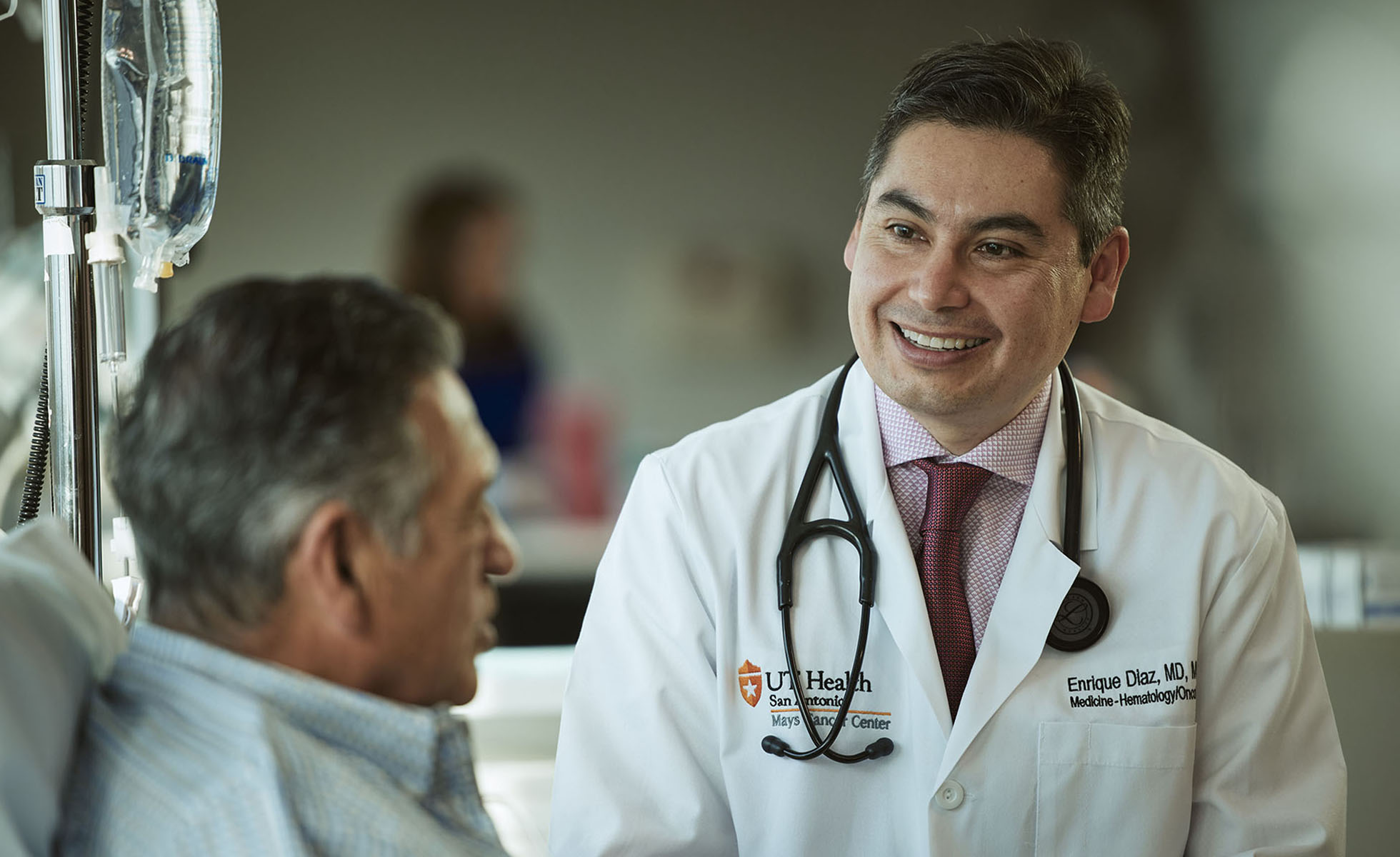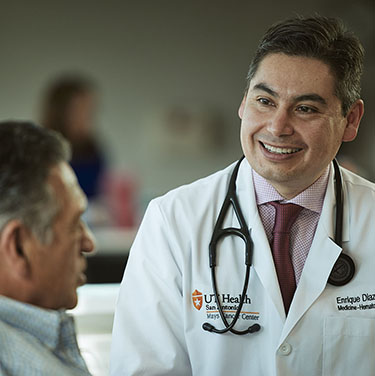

Blood Disorders & Hematology Program
- About Us
-
Cancer Care
-
Our Cancer Programs
- Adolescent and Young Adult Cancer Program
- Blood Cancer & Hematological Malignancy Program
- Blood Disorder (Hematology) Program
- Breast Cancer Program
- Cancer Genetics Program
- Cancer Risk Reduction and Education Clinic
- Cardio-Oncology Program
- Childhood Cancer Survivorship Program
- Endocrine Tumor Program
- Eye Cancer Program
- Gastrointestinal (GI) Cancer Program
- Genitourinary Cancer Program
- Gynecologic Oncology Program
- Head and Neck Cancer Program
- Liver Tumor and Cancer Program
- Lung Cancer Program
- Neuro-Oncology (Brain Tumor) Program
- Neurofibromatosis Program
- Pediatric Neuro-Oncology Program
- Pediatric Oncology Program
- Pediatric Sarcoma Program
- Pediatric Thrombosis Program
- Radiation Oncology
- Sarcoma Cancer Program
- Skin Cancer Program
- Supportive Cancer Care Program
-
Screening and Diagnosis
- Cervical Cancer Screening Guidelines
- Colorectal Cancer Screening
- Endometrial (Uterine) Cancer Screening Guidelines
- Hepatitis and Cancer
- HPV Vaccine and Screenings
- Liver Cancer Guidelines
- Lung Cancer Screening
- Mammogram
- Ovarian Cancer Screening Guidelines
- Prostate Cancer Screening Guidelines
- Skin Cancer Screenings
- Sun and Skin Safety
- Tobacco Use and Cancer
- Skin Cancer Screenings
- Cancer Genetics Program
- Cancer Survivorship Program
- Cancer Treatments
- Conditions
-
Our Cancer Programs
- Clinical Trials and Research
- Donate and Volunteer
- Education
- Patients and Families
- Appointments
- Doctors and Locations
-
Community Outreach and Engagement Program
- Message from COE Leadership
- South Texas Cancer Burden and COE Areas of Work
- Our COE Impact
- COE Community Advisory Board
- COE Publications
- Avanzando Caminos (Leading Pathways) Study
- Estudio Avanzando Caminos (Leading Pathways)
- San Antonio Firefighters Cancer Prevention Program
- STAR Immunotherapy Study
Our fellowship-trained blood disorder experts (hematologist oncologists) treat a broad range of conditions affecting adults and children. Many of our specialists, including specialized pediatric hematologists, focus solely on blood disorders. You can count on us for an expert diagnosis, timely care using leading therapies and support services when necessary.
Coming to the cancer center and seeing a hematologist oncologist for a blood disorder typically does not mean that you have cancer. A small number of blood disorders can become cancerous, however.
Hematologist oncologists have specialized expertise in how blood cells and bone marrow function. They specialize in evaluating and treating both blood-related issues and cancer. We explain how your diagnosis may affect your long-term health and the steps we’re taking to manage it.
Blood disorders we treat
- Hemophilia & Blood-Clotting Disorders
- Iron Overload (Hemochromatosis)
- Rare Blood Disorders
- Sickle Cell Disease
Why choose us for blood disorder care?
- Accurate diagnosis: We diagnose rare and complex problems with a high degree of accuracy. For some disorders, our hematologists examine blood samples under a high-resolution microscope. Doctors diagnose other disorders, including abnormally low platelet counts, primarily by thoroughly assessing you at the bedside. Our expertise helps us make the right diagnosis.
- Services for children and families: We help families of pediatric patients navigate challenges that blood disorders can bring to everyday life. Our psychologist provides emotional support. Social workers connect families with helpful services to address practical needs, so they can focus on caring for their child.
- Leading care: For some conditions, like hemophilia, we are the only nationally recognized program in the region. We deliver therapies that research has shown to be appropriate for children.
- Research and clinical trials: Our active role in blood disorder research gives eligible patients access to the latest therapies, some of which are only available through clinical trials. We participate in top-ranked research networks, enabling us to tap the expertise of world-renowned specialists when necessary.
Find out more about:
Emergency access for life-threatening blood disorders
Our experts are available at all hours of the day and night for patients with urgent blood disorder symptoms. These conditions often occur in pregnant women and include complications of high blood pressure. We perform assessments, run advanced testing and may start you on treatment, all in the same visit.
Expert blood disorder care in South Texas
We care for a wide range of blood disorders, including:
Anemia
Anemia occurs when low levels of red blood cells make it difficult for your organs to get enough oxygen. Our expertise includes diagnosing and treating complex and severe anemias.
You may need a blood transfusion, which delivers blood from a healthy donor through a needle in your arm. You may also need medications to boost your red blood cells’ function.
Blood clots (thrombosis)
Thrombosis refers to blood clots that form in veins far away from the heart, such as in your legs (deep vein thrombosis). Our expertise includes treating clots in unusual sites, such as the bowel, liver or brain.
We also specialize in blood clots that could lead to stroke or heart attack in young people. Therapies may include blood thinners when appropriate.
Blood disorder emergencies in pregnant women
We care for potentially life-threatening blood disorders that may occur during pregnancy, including complications of high blood pressure.
Our team is available around the clock to assess troubling symptoms, find the cause of complications and make care recommendations. We work as a team with obstetricians to safely deliver the baby early, if necessary. Find out more about obstetrics and gynecology.
Additional bleeding disorders
Other bleeding disorders our experts treat include:
- Low immunoglobulins (hypogammaglobulinemia): This condition occurs when there’s an abnormally low level of a certain blood protein, gamma globulin. This deficiency weakens the immune system, raising the risk of infection. We perform a thorough evaluation so you receive an accurate diagnosis and timely treatment.
- Hemophilia: This condition affects the body’s ability to stop bleeding. We are the only nationally recognized hemophilia program in the region and have a long-standing history of care excellence. Learn more about hemophilia.
- Platelet disorders: Platelets are a type of cell that helps blood to clot. Disorders may include abnormal platelet numbers or function. These problems can lead to too much or too little clotting. Restoring this balance requires expert evaluation and treatment.
- White blood cell disorders: White blood cells protect the body against germs and disease. Disorders may include abnormal white blood cell levels or cells that do not work properly. We perform a thorough evaluation to determine the source of the problem.
Sickle cell disease
Our team of pediatric and adult specialists delivers comprehensive care to help control symptoms and make daily life more predictable. You receive nationally recognized sickle cell disease care, including access to newly approved medications. Learn more about sickle cell disease.
Thrombosis in pregnant women
Some women produce high levels of blood-clotting proteins during pregnancy. We help women at risk avoid complications, with care that may include blood-thinning medications. We are experienced in working with medications that are safe for a pregnant woman and her unborn child.
Care locations
Zeller Building
- Hematology | 3rd Floor
University Hospital
- Pediatric Blood Disorder Hematology Program | Horizon Tower 10th Floor
- Pediatric Thrombosis Program | Horizon Tower 10th Floor
Make an appointment
Take the first step by visiting our blood disorder experts for testing, a second opinion or to learn about treatment options.
Discover leading care
Our doctors work alongside renowned cancer experts, giving you access to advanced care methods.
Plan your visit
Get answers to frequently asked questions (FAQs) about visiting Mays Cancer Center.

 Close
Close
